
Authors: David Styles, Colm Duffy, Remi Prudhomme, George Bishop, Mary Ryan and Cathal O’Donoghue, June 2024
Year: 2024
Ireland’s agriculture, forestry and other land use (AFOLU) sector accounts over 40% of national greenhouse gas (GHG) emissions. The Climate Action and Low Carbon Development Act 2021 commits Ireland to reach a legally binding target of net-zero GHG emissions by 2050, yet emissions from this sector continues to rise. Globally, it is assumed that land management will provide a net carbon sink to offset residual emissions from agriculture and other sectors. However, Ireland’s land sector is a large net emitter of carbon dioxide (CO2) owing to large areas of drained organic soils and low afforestation rates relative to forest harvest rates. SeQUEsTER uniquely applied a back-casting approach to identify what “solutions” to net zero could look like for the agriculture and land sector.
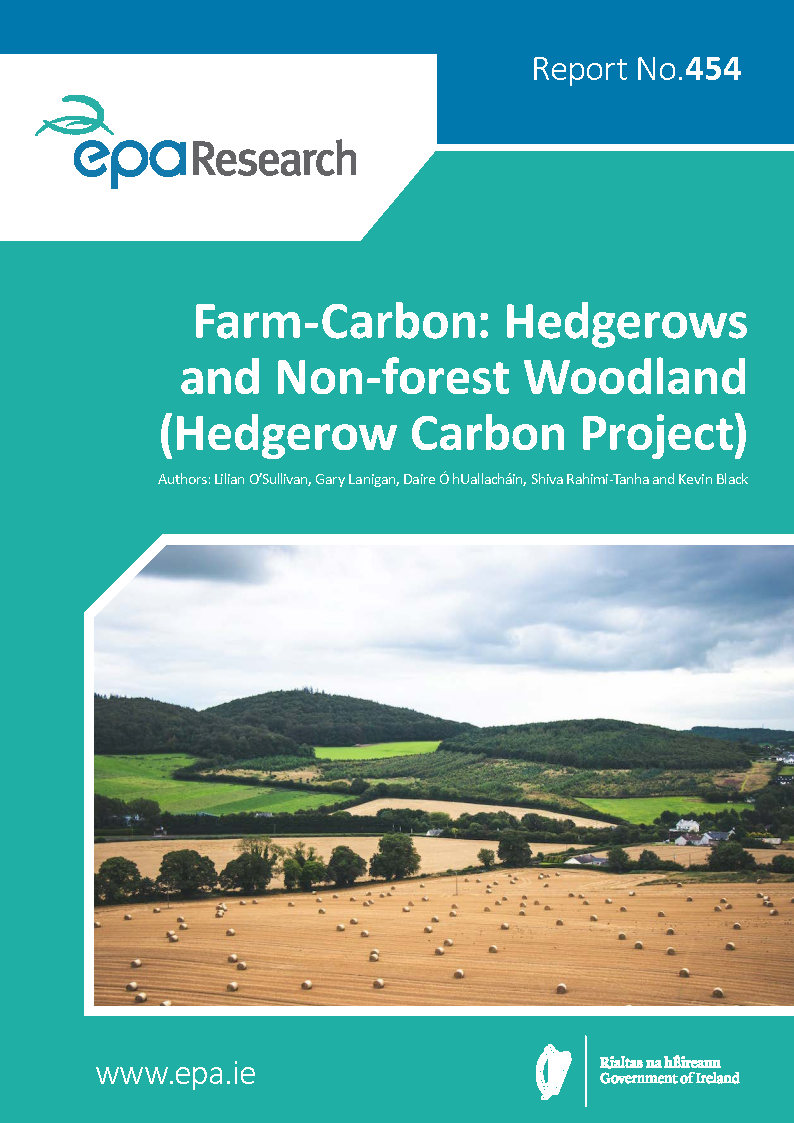
Authors: Lilian O’Sullivan, Gary Lanigan, Daire Ó hUallacháin, Shiva Rahimi-Tanha and Kevin Black, March 2024
Year: 2024
The EU aims to be climate neutral by 2050. Central to this ambition is land management that supports carbon sequestration, and enhancement of carbon sinks or the reversal of their emissions. Current national greenhouse gas emission inventory submissions to the United Nations Framework Convention on Climate Change show that the land use, land use change and forestry (LULUCF) sector is a net source of emissions in Ireland. However, emissions and removals are not currently disaggregated in national emission inventory estimates. Currently, hedgerows are not explicitly accounted for in national inventory reports.
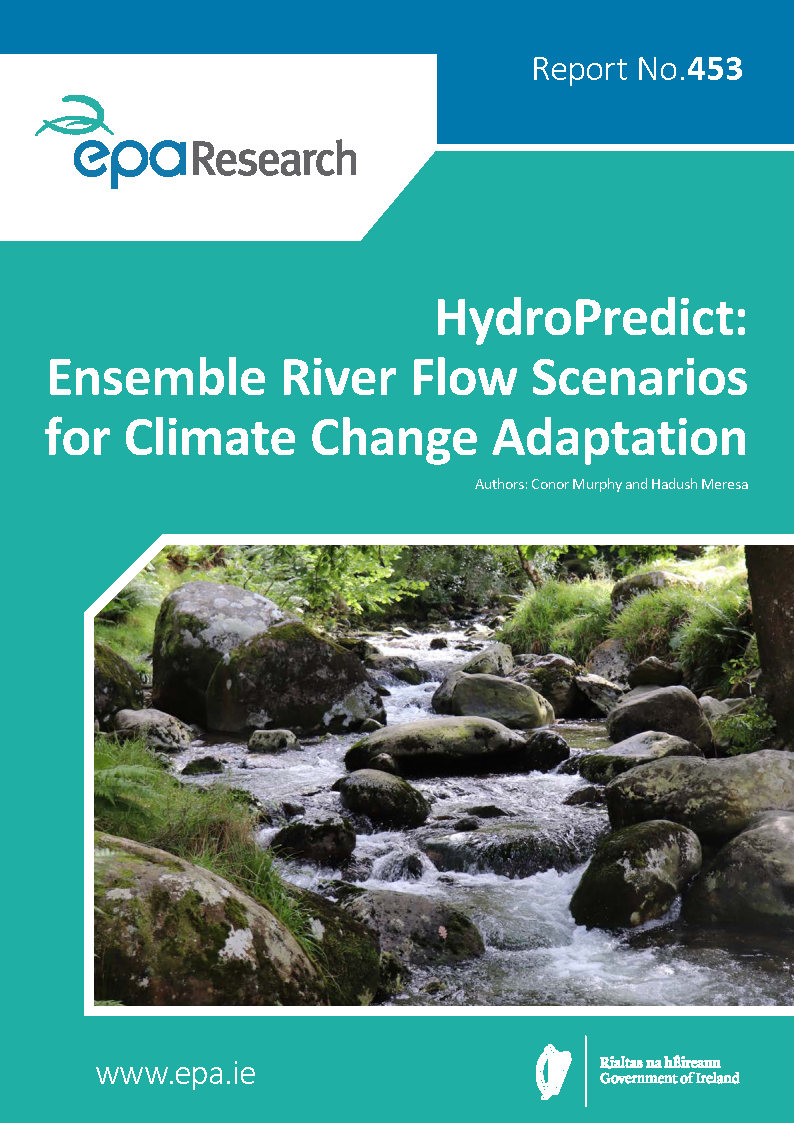
Authors: Conor Murphy and Hadush Meresa, March 2024
Year: 2024
Higher greenhouse gas emissions are associated with large reductions in average summer and annual low flows in rivers. Changes in meteorological droughts in Ireland are driven by a transition to wetter winters and drier summers, together with increased evapotranspiration losses during summer and late spring months, leading to more frequent spring and summer droughts. The magnitude of future drought changes depends on future greenhouse gas emissions, with the most substantial changes found for higher emissions. Adapting to climate change in the water sector should place an increased emphasis on addressing the changing nature of droughts, especially across sensitive sectors. Using the latest climate models and emissions storylines, this research project assessed the projected impacts of climate change on flow conditions and droughts across 37 river catchments in Ireland.

Authors: Ilaria Bernardini, Mark Tucker, Moreno Stellini and Emmanouil Kakouris, February 2024
Year: 2024
Extreme weather events such as storms, landslides, river floods and coastal phenomena have threatened and damaged many different regions across Ireland. These events, while rare and often short-lived, can have a devastating impact on critical infrastructure systems. As a result of climate change, these events are becoming more frequent and more intense, affecting not only physical infrastructure but also the environment and society as a whole. Using risk-based approaches in assessing the impacts of extreme weather events and climate change is a well-established method of identifying the most vulnerable infrastructure, assessing the risks posed to that infrastructure and developing strategies to minimise those risks. This report presents an overarching risk assessment methodology for assessing risks posed to critical infrastructure by climate change.
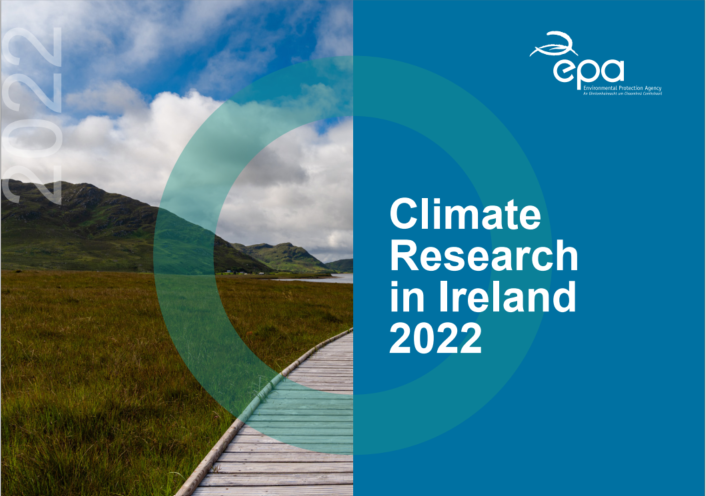
The Climate Research Coordination Group (CRCG) supports and promotes coordination and knowledge exchange between state bodies involved in funding climate research in Ireland., February 2024
Year: 2024
This report has been prepared by the EPA on behalf of the Climate Research Coordination Group
-449.jpg)
Authors: Conor Murphy, Kevin Leonard, Rory Moore and Stephen Flood, February 2024
Year: 2024
The island of Ireland is one of the most open economies in the world for trade and finance. While Ireland’s open economy, trade and finance links have helped to generate significant wealth and improve living standards, this also makes Ireland among the most vulnerable to climate change’s impacts on international trade. Transboundary Climate Risks (TCRs) cross national borders and are associated with the impacts of climate change. The Transboundary Climate Risks for the Island of Ireland (TCRII) project undertook a literature review and worked with stakeholders to identify approaches for the assessment of TCRs and synergies that can be leveraged on an all-island basis. The findings informed recommendations for better accounting for these emerging risks, to realise the national climate objective of achieving a climate-resilient economy and society by 2050.
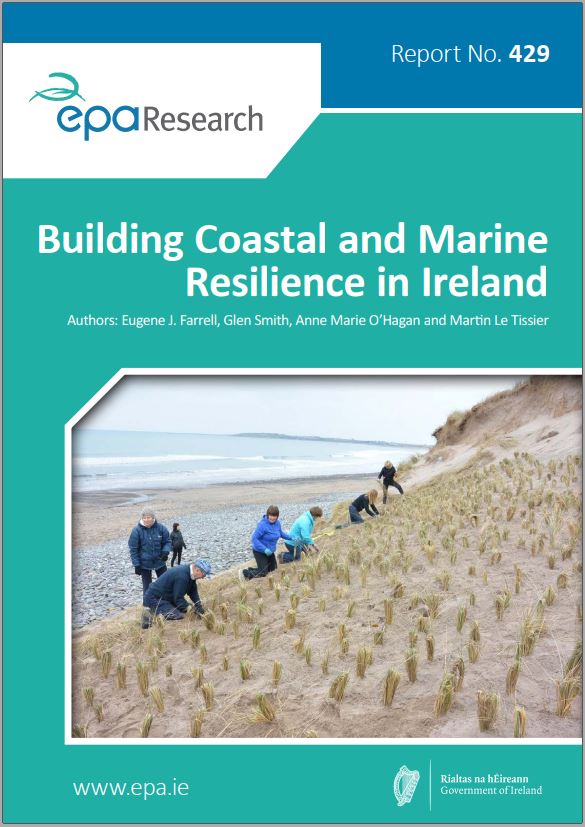
Authors: Eugene J. Farrell, Glen Smith, Anne Marie O’Hagan and Martin Le Tissier, February 2023
Year: 2023
The identification and increased awareness of climate change risks to Ireland’s coastal communities highlights the importance of building national resilience across socio-ecological and economic systems. This research investigated barriers to the environmental and socio-economic resilience of two coastal communities: Maharees, County Kerry, and Youghal, County Cork.
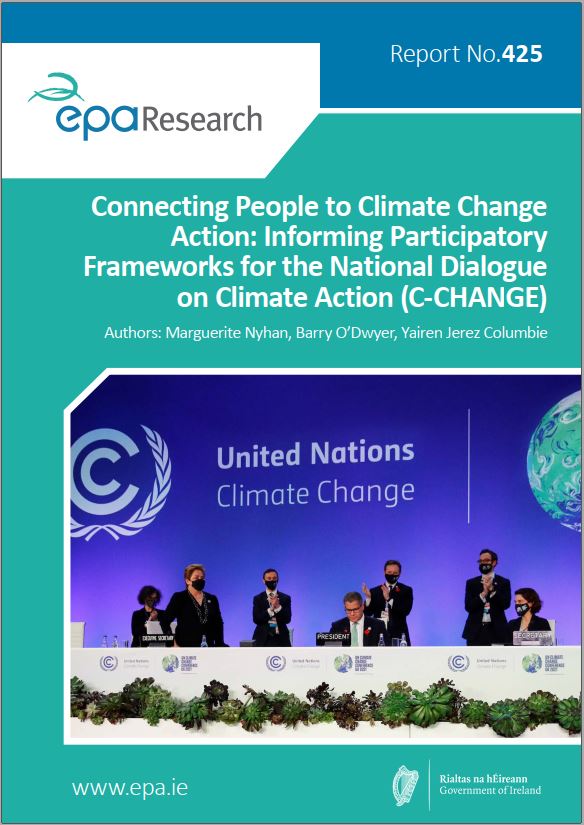
Authors: Marguerite Nyhan, Barry O'Dwyer and Yairen Jerez Columbié, October 2022
Year: 2022
Ireland has committed to achieving a net-zero and climate-neutral economy by 2050. The C-CHANGE project is focused on developing solutions and provides guidance on facilitating stakeholders’ and citizens’ participation in environmental and climate dialogues and thus in climate action nationally and internationally. The research outputs provide clear and flexible guidelines that can be adapted to different contexts, sectors and audiences by practitioners, researchers and authorities.
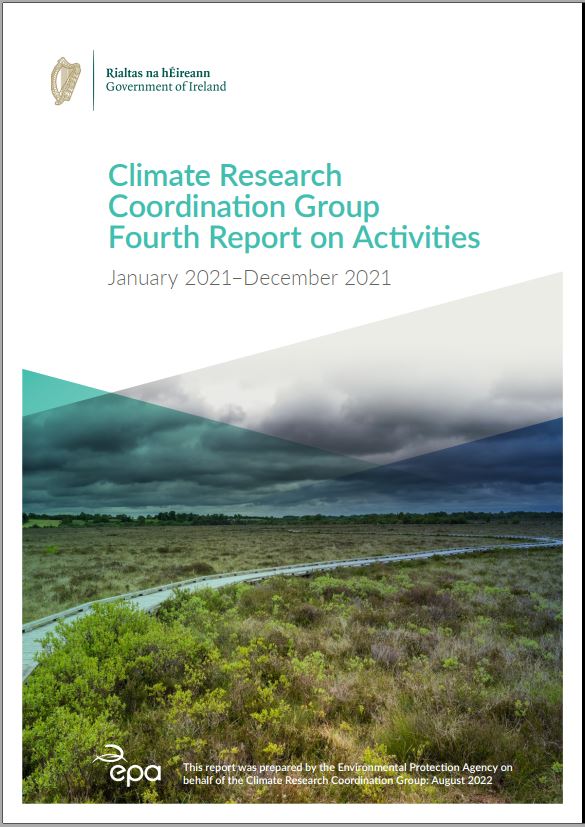
This report has been prepared by the EPA on behalf of the Climate Research Coordination Group, September 2022
Year: 2022
This fourth report presents a summary of the Climate Research Coordination Group’s activities in 2021.
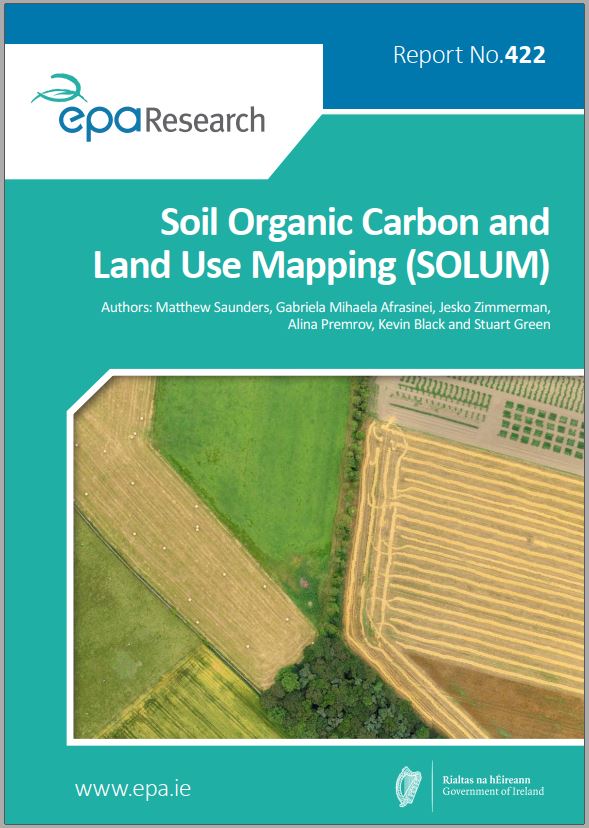
Authors: Matthew Saunders, Gabriela Mihaela Afrasinei, Jesko Zimmerman, Alina Premrov, Kevin Black and Stuart Green, September 2022
Year: 2022
Soils contain more than twice the amount of carbon held in the atmosphere, but globally approximately 1600 million tonnes of carbon are lost from the soil each year due to cultivation and land use. This research highlights how large geospatial datasets can provide an excellent source of land use information and can detect land use change events at both national and regional scales. The rule-based land use and soil inventory coupled with the soil cluster approach developed in this work could be implemented in current national land use mapping activities to enhance our ability to assess the impacts of land use and land use change on soil carbon stocks.
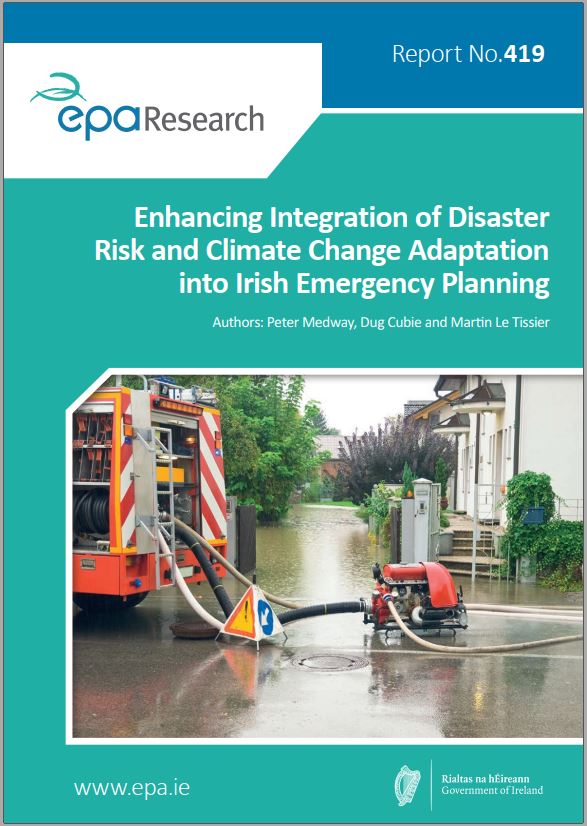
Authors: Peter Medway, Dug Cubie and Martin Le Tissier, August 2022
Year: 2022
Climate research tells us that extreme weather events will become more frequent and severe. Climate change adaptation (CCA) focuses on the probable chronic long-term impacts likely to occur across multiple sectors. In contrast, emergency planning and disaster risk reduction (DRR) primarily aims to address acute short-term impacts. The project identifies how existing approaches to disaster risk reduction, disaster risk management (DRM) and CCA in Ireland are juxtaposed and concludes that identifying ways to promote coordination and align incentives, priorities and planning processes will facilitate a more holistic and comprehensive approach to DRM at all levels of government.
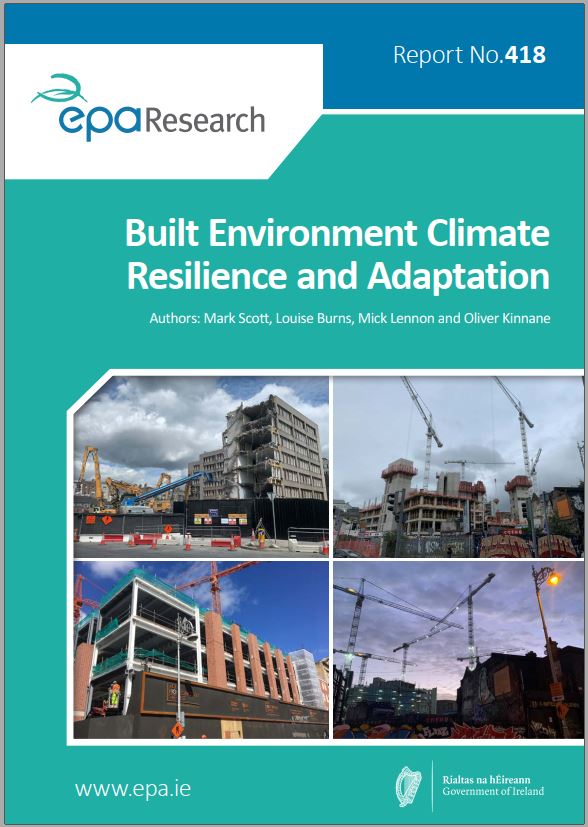
Authors: Mark Scott, Louise Burns, Mick Lennon and Oliver Kinnane, August 2022
Year: 2022
Climate change risks present a clear challenge for Ireland’s built environment. Adaptation is the critical second pillar of climate action alongside mitigation. This needs an urgent whole-of-government and whole-of-society approach. There is significant scope for increasing policy coherency towards adaptation through the planning system, building control, building regulation performance requirements, industry standards and building design specifications.
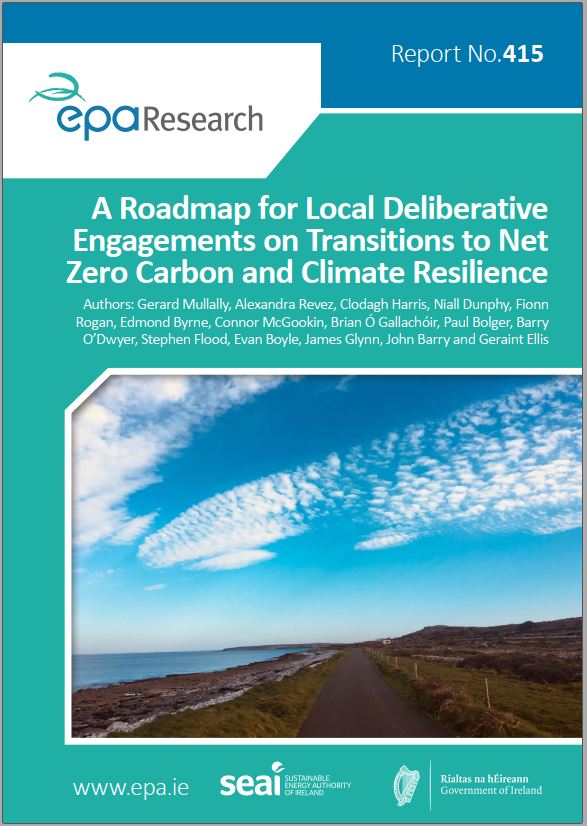
Authors: Gerard Mullally, Alexandra Revez, Clodagh Harris, Niall Dunphy, Fionn Rogan, Edmond Byrne, Connor McGookin, Brian Ó Gallachóir, Paul Bolger, Barry O’Dwyer, Stephen Flood, Evan Boyle, James Glynn, John Barry and Geraint Ellis , July 2022
Year: 2022
Ireland faces considerable challenges in transitioning to a net-zero carbon and climate resilient future. This research focused on the challenge of engaging citizens and communities in climate action while also recognising that new and novel approaches are required to enable the transition to climate resilience. The co-creation of the Deliberative Futures Toolkit together with local, scientific and policy communities, provides a resource that can be used by communities and policymakers.
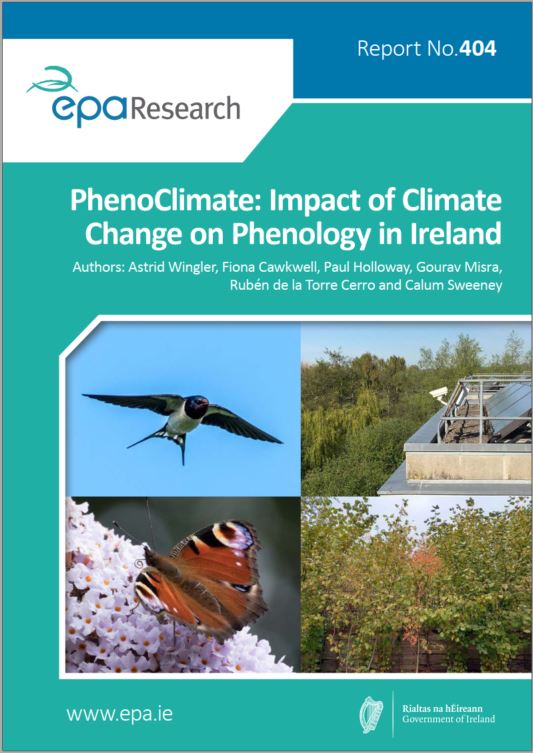
Authors: Astrid Wingler, Fiona Cawkwell, Paul Holloway, Gourav Misra, Rubén de la Torre Cerro and Calum Sweeney, March 2022
Year: 2022
The PhenoClimate project determined the impact of climate change on seasonal life cycle (phenological) events and the consequences for species interactions. For Irish woodlands, an advance of the growing season in spring was identified using satellite remote sensing. Arrival of migratory birds was found to advance too, however, instances in which migratory birds showed asynchrony with insect first flight dates were identified, suggesting that climate change can result in phenological mismatch.
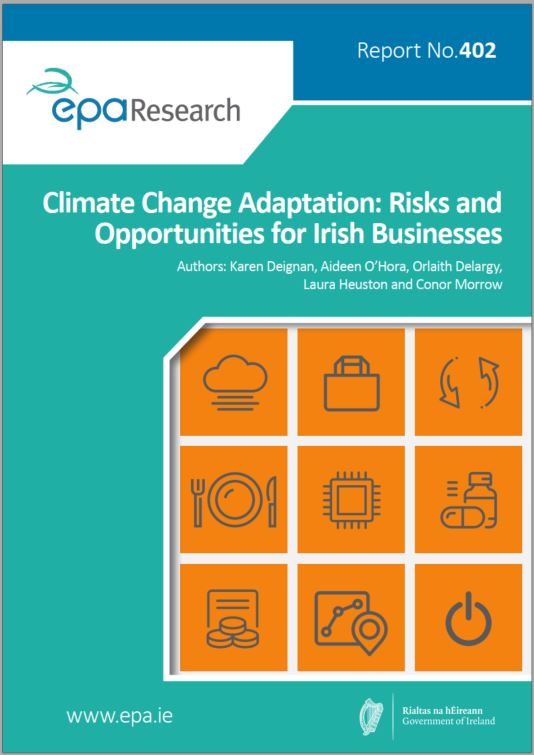
Authors: Karen Deignan, Aideen O’Hora, Orlaith Delargy, Laura Heuston and Conor Morrow, February 2022
Year: 2022
Climate change is already affecting Irish businesses and these impacts are likely to increase in severity. Our research identified material climate risks (pressures) for Ireland’s private sector. By raising awareness of climate risks and opportunities, this research can help the private sector identify and develop solutions to address the environmental and economic challenges that they face. This project can also inform the development of solutions to develop business-level (rather than sector-level) resilience and adaptation plans.
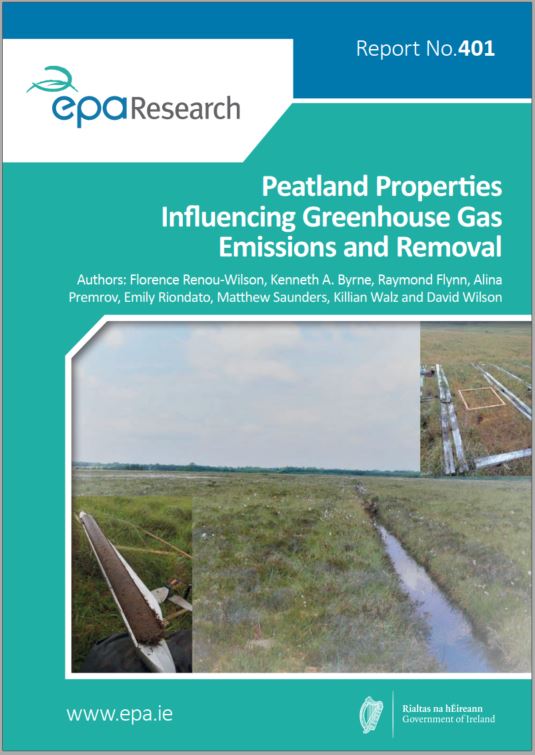
Authors: Florence Renou-Wilson, Kenneth A. Byrne, Raymond Flynn, Alina Premrov, Emily Riondato, Matthew Saunders, Killian Walz and David Wilson, January 2022
Year: 2022
Irish bogs have been drastically altered by human activities and the sampled peat properties reflect the nature and magnitude of the impact of land use and management. A recognition of the heterogeneity found across Irish peat soils, together with an understanding of the relationships between key soil properties, are critical for developing effective strategies to reduce the carbon footprint of these degraded ecosystems. Our findings clearly support the need for a site-by-site approach for rewetting management schemes.
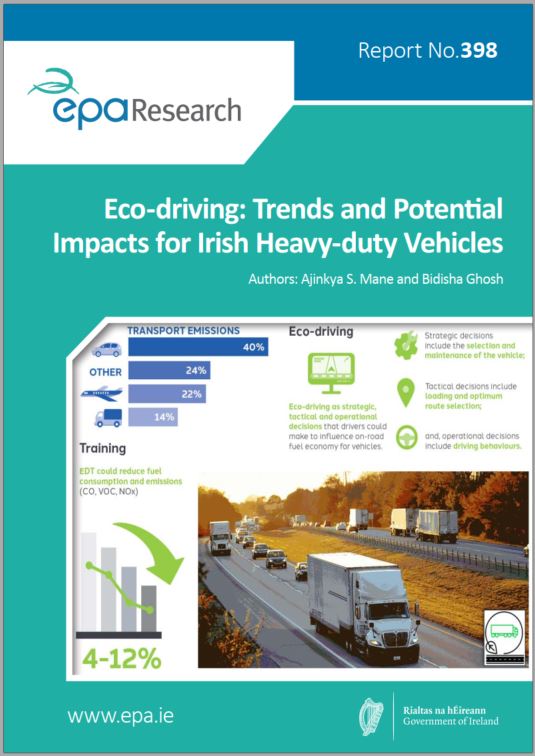
Authors: Ajinkya S. Mane and Bidisha Ghosh, December 2021
Year: 2021
The “Eco-HDV” research project evaluated the impacts of adaptation of eco-driving programmes in the Irish heavy-duty vehicle fleet, focusing especially on the freight sector. The research identified perceptions and awareness of eco-driving training, reviewed the best eco-driving practices and analysed the possibilities of adaptation of eco-driving programmes. The project generated guidelines for the implementation of eco-driving programmes and other measures to reduce vehicular emissions from the Irish heavy-duty vehicle fleet.
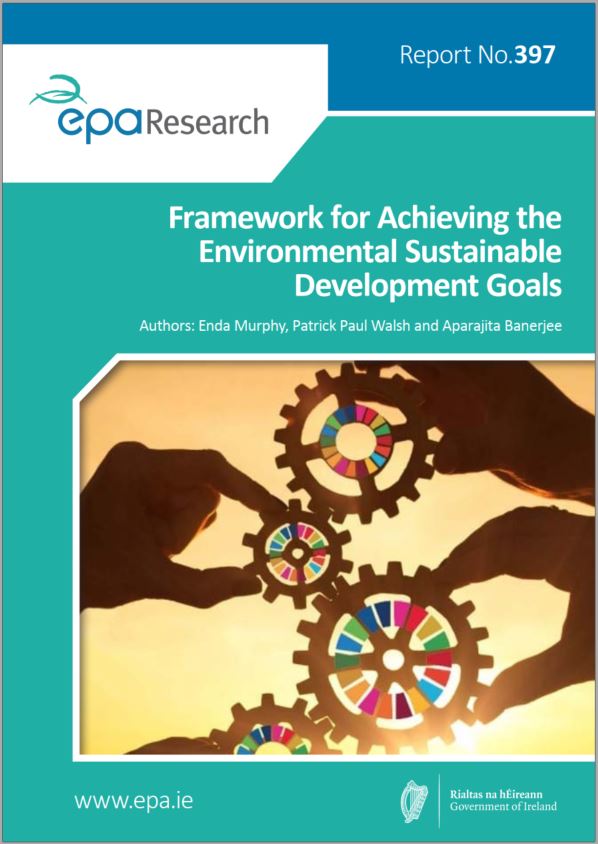
Authors: Enda Murphy, Patrick Paul Walsh and Aparajita Banerjee, December 2021
Year: 2021
This report contributes to a range of international and national policy areas, creating a positive feedback loop between policies for environmental SDG promotion, governance for the SDGs and integrated environmental policymaking. It provides an important evidence base for assessing national progress on the environmental SDGs relative to EU peer nations. This is the first time that Ireland’s progress on the SDGs has been assessed on an SDG target and indicator basis relative to peer nations.
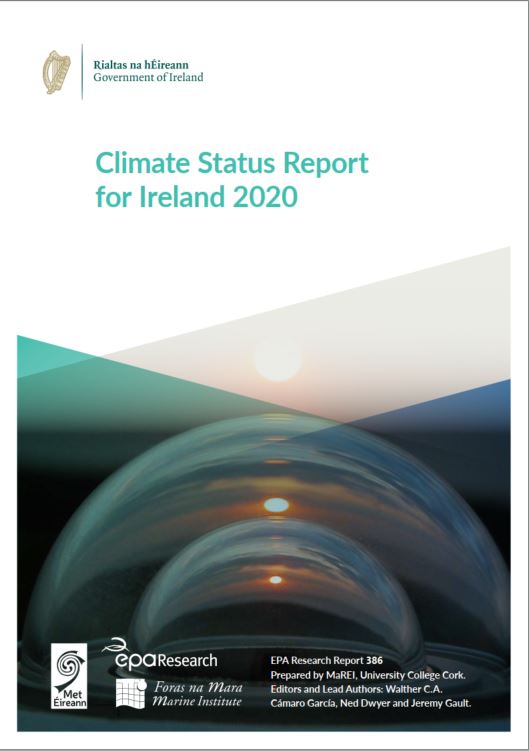
Editors and Lead Authors: Walther C.A. Cámaro García and Ned Dwyer, August 2021
Year: 2021
As an island on the western boundary of Europe facing the Atlantic Ocean, Ireland is ideally positioned to measure and assess ongoing climate change. The first Status of Ireland’s Climate report was published in 2013. This second status report provides an update, incorporating new datasets and analyses as well as reporting ongoing climate observations over the last 7 years.
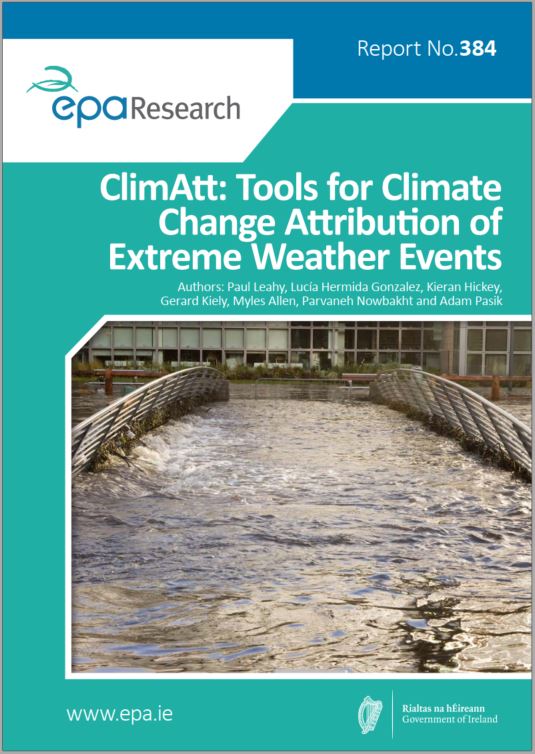
Authors: Paul Leahy, Lucía Hermida Gonzalez, Kieran Hickey, Gerard Kiely, Myles Allen, Parvaneh Nowbakht and Adam Pasik, July 2021
Year: 2021
Extreme weather events, such as heavy or prolonged rainfall events, droughts and heatwaves, have the potential to cause significant social and economic disruption in Ireland. The ClimAtt project has examined the state of the art in climate change attribution of extreme weather events. Met Éireann’s observational records have been used to test and validate several climate model datasets for attribution purposes. The most appropriate datasets and methods to use to investigate the influence of climate change on extreme weather events occurring in Ireland have been recommended.